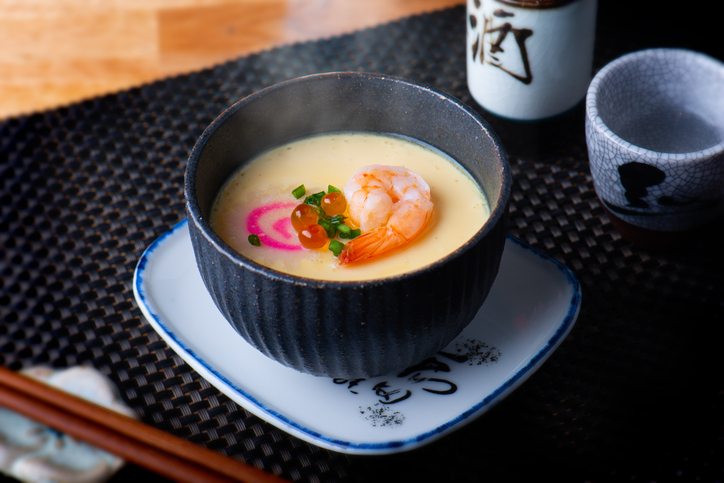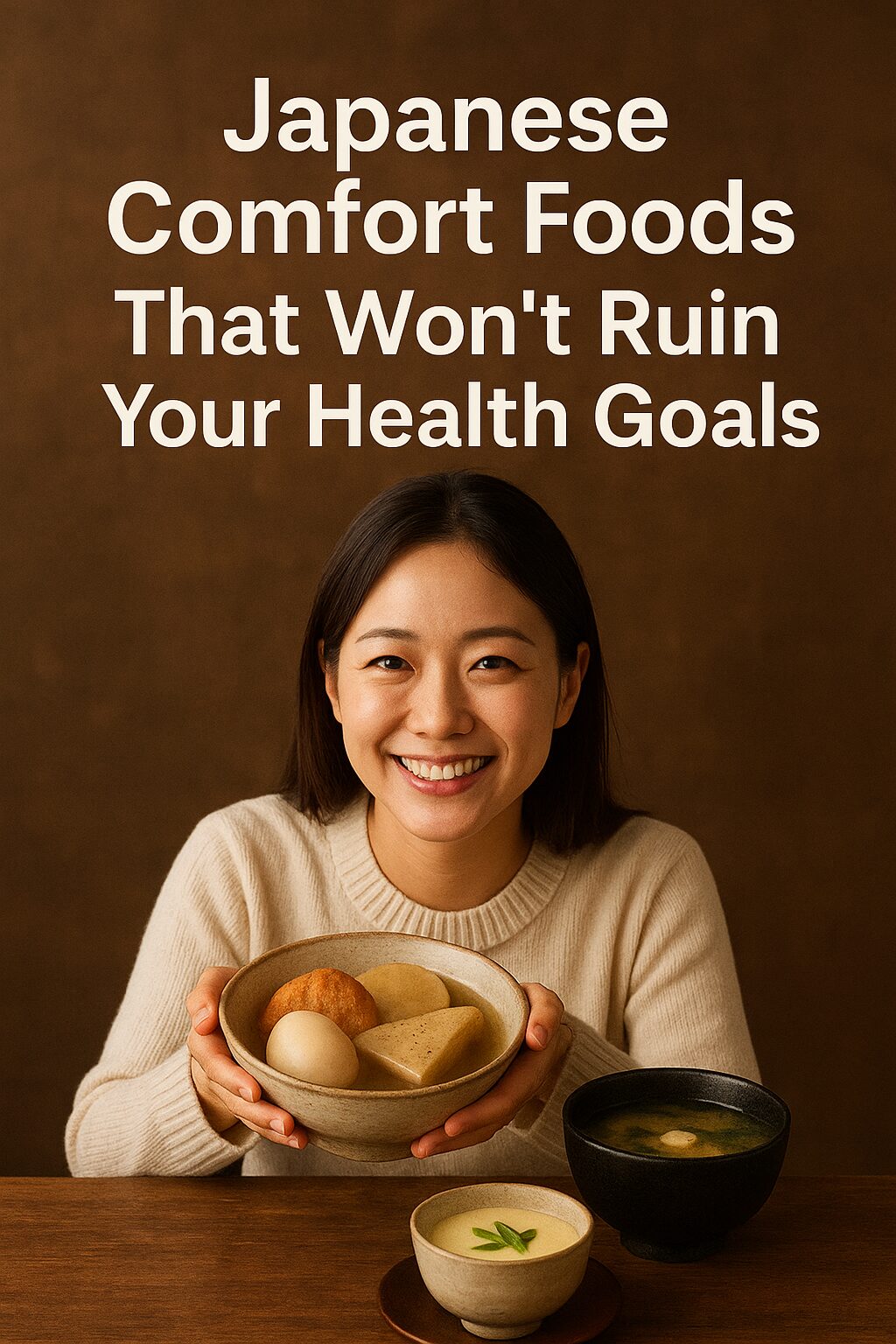As temperatures drop and cozy evenings become the norm, it’s only natural to crave warm, comforting meals. The problem? Many Western comfort foods—like creamy casseroles, buttery mashed potatoes, or sugary desserts—come loaded with calories and fat.
But in Japan, comfort food takes a different form: gentle, nourishing dishes that warm both body and spirit without derailing your health goals. Whether you’re dining out or cooking at home, you can enjoy the same sense of satisfaction with far less guilt.
The Japanese Concept of “Comfort Without Excess”
In Japanese food culture, comfort isn’t tied to indulgence—it’s tied to balance. Meals are meant to be warming, restorative, and easy to digest, especially in colder seasons.
The phrase “hara hachi bu” (腹八分目) — meaning “eat until you’re 80% full” — embodies this mindset. It encourages mindfulness and satisfaction without overindulgence, helping people maintain a healthy weight and steady energy even during the holiday season.
1. Oden – A Light, Soul-Soothing Hot Pot
Few dishes capture the essence of winter in Japan like oden, a gentle simmered stew featuring eggs, tofu, radish, konjac, and fish cakes in a soy-based broth. It’s the ultimate example of healthy comfort food — hearty yet light, flavorful yet simple.
Why it’s healthy:
-
Low in fat and sugar
-
High in protein and fiber
-
Rich in warming minerals from the broth
How to try it in North America:
Many Japanese restaurants offer oden during the winter months, but you can easily make a simplified version at home. Combine vegetable broth, soy sauce, and a bit of dashi powder, then simmer your favorite ingredients—like hard-boiled eggs, tofu, and daikon radish—until tender.
2. Chawanmushi – The Japanese Custard You Can Eat Guilt-Free
At first glance, chawanmushi looks indulgent—a silky egg custard served warm in a cup—but it’s surprisingly light and nourishing. It’s made with eggs, dashi broth, and small bits of seafood or vegetables, gently steamed until smooth.
Why it’s healthy:
-
High in protein, low in calories
-
Contains collagen-supporting amino acids from eggs and dashi
-
Easy on digestion
Try it at home:
You can make a simple version using eggs, chicken broth (if you don’t have dashi), soy sauce, and mushrooms. Steam it in a small bowl for 10–15 minutes—an elegant, low-fat treat for chilly nights.

3. Yudofu – Tofu Hot Pot for Gentle Warmth
Yudofu (湯豆腐) is the ultimate minimalist comfort dish: tofu gently simmered in hot water or light broth, served with soy sauce or ponzu for dipping.
Why it’s healthy:
-
Pure plant-based protein
-
Rich in calcium and isoflavones (which support hormonal balance)
-
Perfect for light dinners after overindulgent days
How to enjoy it anywhere:
Tofu and ponzu are available in most North American supermarkets. Add spinach, napa cabbage, or mushrooms to the broth for extra nutrients.
Applying the Japanese “Guilt-Free Comfort” Concept to Western Meals
You don’t have to cook Japanese food to adopt its philosophy. Try these ideas inspired by Japan’s mindful approach:
-
Choose broth-based soups over creamy ones
-
Swap mashed potatoes for mashed tofu or cauliflower
-
Use soy sauce, miso, or ginger to season instead of butter or cream
-
Savor slowly and enjoy each bite mindfully—true comfort comes from the experience, not excess
By blending these small changes into your winter meals, you can recreate the cozy satisfaction of comfort food while staying aligned with your wellness goals.
Supporting Inner Warmth and Balance with Effisoy®
For women over 50, maintaining healthy balance during winter isn’t just about food—it’s also about supporting your body’s natural functions that change with age.
Effisoy®, a natural menopause supplement by Juveriente®, provides aglycone isoflavones derived from fermented soy. This unique Japanese ingredient helps restore your body’s ability to produce its own DHEA, supporting:
-
Hormonal balance
-
Skin moisture and elasticity
-
Natural energy and metabolism
Effisoy® complements Japan’s whole-body approach to wellness—nourishing the inside so you can glow on the outside, even through winter’s dryness and fatigue.
 The only supplement to contain fermented soy isoflavone beside Japan.
The only supplement to contain fermented soy isoflavone beside Japan.
4. Miso Soup – Small but Mighty
No Japanese comfort food list is complete without miso soup, the humble bowl that appears at nearly every meal.
Why it’s powerful:
-
Fermented miso paste provides probiotics for gut and skin health
-
Contains warming minerals and antioxidants
-
Hydrates and soothes digestion
You can enjoy miso soup anywhere—most casual Japanese restaurants serve it, and instant miso paste packets are easy to find in local supermarkets.
5. Sweet Comfort Without the Sugar Crash
When the craving for something sweet strikes, the Japanese approach moderation and balance here too.
Try small, natural desserts like:
-
Yokan (sweet red bean jelly)
-
Steamed sweet potatoes
-
A small bowl of fruit with matcha tea
These treats satisfy without excess sugar or guilt, leaving you calm and content.
A Winter of Warmth and Wellness
This season, let your comfort food nourish—not burden—your body.
By embracing the Japanese way of comfort, you can stay cozy, healthy, and balanced without giving up satisfaction.
Warm soups, gentle flavors, and mindful eating—these are the true secrets to healthy comfort foods for winter.









